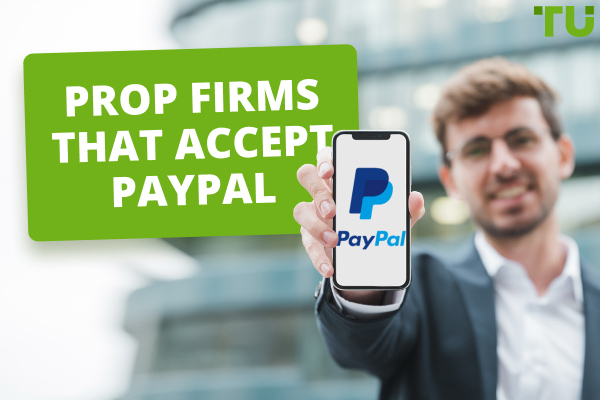Best Beginner-Friendly Prop Firms

Best Prop Trading Firm for Beginners - Topstep
Top Prop Trading Firms for Beginners:
-
1
Topstep - best for stock index futures trading
-
2
The 5%ers - Best for funding options and diverse instruments Instant funding. News trading. Forex, gold & silver, indices
-
3
FTMO- best prop firm with friendly products and trading platforms
-
4
Fidelcrest - Best for swing trading flexibility Aggressive accounts for swing trading. No limitations on holding periods
-
5
Earn2Trade - Best for educational futures trading Virtual trading simulation. Trader Career Path. Gauntlet Mini. Up to $400,000 funding
Are you interested in making a living as a trader but don't know where to start? The trading world can be challenging and rewarding, but becoming a funded trader is no easy feat. However, you can take the first step towards achieving your goals with the right tools and knowledge.
In this article, we'll guide you through the process of becoming a funded trader, sharing tips and tricks along the way to help beginners navigate the exciting world of trading. Whether you're just getting started or have been trading for a while, this article will provide insights to assist you in securing funding as a trader.
What Is a Good Prop Firm for a Beginner?
As a beginner in the trading world, finding a good prop firm can be daunting. However, some firms offer a variety of benefits which could help you to reach your trading goals. The first important feature to consider is the low minimum investment or free accounts.
These firms allow you to start trading with just a small amount of money or even for free, which can help reduce the risk involved. Another benefit is the presence of educational programs specifically designed for beginners.
You can learn from trading experts through webinars, seminars, and other events, getting personalized guidance on how to make your trades more successful. Lastly, trading contests are another common feature that many firms offer.
Participating in a contest can help you test your strategies and gain trading confidence. With these features, you can find a prop firm that can support your journey towards achieving your trading goals.
Top Prop Trading Firms for Beginners
Below are the seven best prop trading firms you can consider as you start prop trading.
1 Topstep
With its brand power and reputation as an industry innovator and one of Inc 5000’s fastest-growing companies, Topstep has earned the trust of many traders. To participate in the funded account program, all traders begin with the Trading Combine. You can open a real-time simulated futures account with $150K, $200K, or $300K buying power.
During the Trading Combine, you can earn a funded trading account if you demonstrate consistent profitability and manage risk appropriately. Using Topstep's capital, you can trade in real time without personal financial risk, with funds provided by Topstep.
As quickly as within eight trading days, traders can qualify to receive a funded account (the amount of funding provided is determined by the Trading Combine plan).
The first $5,000 in profits you make can be withdrawn in full, and 90% of profits exceeding that amount can be withdrawn.
With Topstep, payout requests are processed on a daily basis (payout requests made prior to 10 a.m. CT are processed on the same day).
Topstep’s trader development services include instruction from professional traders, tools, and daily live videos, along with personalized analytics on performance and bonuses for traders.
Trading platforms supported include TSTrader, TradingView, NinjaTrader, Sierra Chart, MultiCharts, R|Trader Pro, and many more.
For a $50k account, Topstep pricing starts at $165 per month. $100k accounts cost $325 per month, and $150k accounts cost $375. Free trials are also available for 14 days.
2 The5ers
The5ers is a good choice for beginners. The 5%ers are known for their unique ways of handling forex funded accounts. These methods may be beneficial to traders who would like to try something different.
General Conditions Review
The 5%ers take a completely different path from the other apps on this list. Each funded trading account is a live, real-money funded trading account funded by The5ers and tradeable by subscribers.
All forex majors such as EUR/USD, USD/CHF, and key cross-currency pairs such as AUD/CAD and GBP/JPY are tradable assets. Each trader must complete the Level 1 Program with a profit target ranging from 10% to 25%.
The Level 1 Program will be closed once the profit target has been archived by trading according to the guidelines. Profit will be distributed in accordance with the profit split, and a new trading account on the next higher financing level will be established with you as a Portfolio Manager Partner.
Costs
The entry cost ranges from $275 to $875.
How Much Money Can You Attract?
The 5%ers offer a 50/50 split on profits.
3 FTMO
To qualify for a funded trading account at FTMO, you must go through a rigorous three-step process:
Enter the FTMO Challenge, where you must meet the profit targets within 30 days.
Begin the 60-day Verification Procedure, during which you must demonstrate that you can repeat your FTMO Challenge success.
After completing the two-step review procedure with the FTMO Challenge and Verification, you will be contacted by FTMO with an offer to trade their capital on accounts ranging from $10,000 to $400,000.
A great fact to note is that FTMO’s stronghold is its currencies. This is the best place to consider a forex funded account, if you enjoy trading currencies. You can trade 44 currency pairs as well as 10 cryptocurrencies. Furthermore, cash indices, commodities, and stock CFDs are available for trading.
The free versions of the three most popular forex trading platforms, MetaTrader 4, MetaTrader 5, and cTrader, are accessible.
Costs
The fee is paid once per FTMO Challenge. While the funded account currency might be USD, GBP, EUR, CZK, CAD, AUD, or CHF, the challenge fee is exclusively charged in Euro. The participation price for the 10k account begins at 155 EUR. The 25k is 250 EUR, the 50k is 345 EUR, the 100k is 540 EUR, and the 200k is 1,080 EUR.
How Much Money Can Attract?
Traders receive capital ranging from $10,000 to $400,000 and an 80/20 split on profits. Whatever the profit a trader earns on the capital given, they will receive 80% of it.
In addition to that, there is a Scaling Plan for funded accounts that allows traders to enhance the Profit Split in their favor up to 90:10 with account sizes up to $2,000,000.
4 Fidelcrest
Fidelcrest offers 13 accounts to suit different types of traders, providing access to more than 1,000 financial instruments. Known for its robust training programs and exceptional support services, the prop firm offers profit splits of up to 90%.
There are two main accounts available at Fidelcrest, Micro Trader and Pro Trader, both of which offer Normal and Aggressive settings. Each risk type is funded at three different levels.
Depending on the risk type, the Micro account has funding between $25,000 and $50,000. A difference between the two lies in the profit targets, the minimum number of trading days, and the maximum loss limits. Micro Trader, for example, has a maximum overall loss limit of 10% and a profit target of 5%. There is a maximum loss of 20% with Aggressive risk, and a maximum profit target of 15%.
Currently, ProTrader accounts are funded between $150,000 and $1 million, of which $1 million is only available for Normal Risk accounts. Both accounts can be leveraged up to 1:100.
Each account type is evaluated in two steps, depending on the minimum number of trading days, maximum daily loss limit, and maximum overall loss limit. The KYC program at Fidelcrest requires that you submit documents in addition to meeting the trading parameters.
The fees for different types of accounts and risk levels vary. It costs between $104 and $474 to open a Micro Normal risk account. The prices for Micro Aggressive accounts range from $157 to $579, while those for ProTrader accounts range from $685 to $2,848
5 Earn2Trade
Earn2Trade is a good choice for beginners. Earn2Trade provides three distinctly funded trading programs. The Gauntlet Program, The Gauntlet Mini, and the all-new Trader Career Path are all available.
A one-time payment is required for the Gauntlet program. Traders manage a $25,000 virtual account for 60 days, during which they must trade at least 30 calendar days and once every week. If they follow the guidelines and meet the 10% profit target, successful candidates will receive a guaranteed funding offer from Helios Trading Partners or Appius Trading.
Topstep Futures and Topstep Forex are similar programs to the Gauntlet Mini. Traders pay a monthly fee and must follow the guidelines. The monthly fee includes trading classes, webinars, and access to Journalytix (TM). Traders will then receive an offer for a funded trading account.
Earn2Trade's newest program is the Trader Career Path. Traders begin with a $25,000 virtual capital account and are funded with a $25,000 account if they pass the Evaluation. After the Evaluation, traders can develop their trading careers and handle assets worth up to $200,000 without paying a monthly subscription fee.
Earn2Trade has the largest variety of trading platforms to choose from, coming close to 20 options. NinjaTrader and Finamark, R|Trader, and Overcharts are the most common, however, Agena Trader, MultiCharts, and many other platforms are also supported.
Costs
The Earn2Trade Trader Career Path costs $150 per month with a starting capital of $25,000. The Gauntlet Mini program offers five account sizes (25k for $150, 50k for $170, $75k for $245, $100k for $315k, and $150k for $350 each month).
Finally, the conventional Gauntlet challenge is offered for a one-time fee of $343.2. Earn2Trade accounts do not have free trials, but discounts of 20%-40% are available below.
How Much Money Can You Attract?
Traders earn 80% of all the profits they make off the capital received.
6 SurgeTrader
SurgeTrader offers 75% profit splits to funded traders who meet their trading criteria. It's the perfect prop firm to diversify your investment portfolio with a variety of tradeable assets.
SurgeTrader has only one phase of evaluation, unlike many other prop firm trading entities. Traders of all skill levels can choose from six packages. With its Starter Package, you get $25,000 in instant funding and a 10% profit target. There’s a maximum trailing drawdown of 5%. The Starter Package is ideal for beginners who want to avoid aggressive accounts.
With a $1 million funding size and 75% profit split, the Master Package is the highest-tier account. A 10% target is set, along with a four-percent daily loss limit and a five-percent maximum trailing drawdown. If you have a lot of confidence in your abilities, this package may be for you.
Additionally, this prop firm offers a wide variety of tradable securities, including crypto and gold, as well as popular stock indices. It’s possible to leverage up to 1:10.
A top proprietary trading firm, SurgeTrader requires all of its clients to undergo evaluations. You need to pass only one phase of the SurgeTrader Audition process. It’s not necessary to earn over 10% of your account balance in order to pass the audition.
Audition fees range from $200 to $6,500 per account. There’s no limit to how many times you can take the audition. You can use credit/debit cards and PayPal to make payments and withdrawals.
7 Lux Trading
Lux Trading is the perfect choice for beginners who want to spend their time hitting their evaluation goals as much as possible. You can trade up to $150,000 with no recurring monthly fees and no profit limits.
On top of forex, this company offers trading in stocks, bonds, and CFDs. When you open a demo account and try to meet profit targets, you can choose between three capital levels.
You can move to higher capital levels with this prop firm's Professional accounts after meeting a 10% profit target in 49 trading days. Your max drawdown limit is 4%, which is reset every month if you withdraw profits. In all stages, profit splits remain at 65%.
The size of your account doubles when you meet those parameters until it reaches $1 million. As a result of this scale-up mechanism, Lux Trading stands out from the competition. The leverage is 1:10 for forex pairs and metals, 1:5 for indices, bonds, and commodities, and 1:1 for equity. Lux Trading allows weekend and overnight holdings, unlike other firms.
In addition to offering superb proprietary trading accounts for beginners, Lux Trading allows you to take as long as you like to reach your evaluation profit target of 6% and avoid a drawdown of more than 4%. You can move on to step two when you earn back your initial fee within 29 trading days and begin using real capital. The parameters remain the same, but 65% of the profits are yours to keep.
Lux Trading accounts range from £299 ($375) to £499 ($626). Wire transfers, Bitcoin withdrawals, and Wise withdrawals are all available as withdrawal methods.
8 City Traders Imperium
City Traders Imperium is a London-based platform offering forex lovers direct trading accounts ranging from $20,000 to $70,000. It allows traders to use all trading strategies, making it the best forex-funded account for beginners.
City Traders Imperium traders can choose between evaluation and direct trading options, where the former is most applicable to beginners. The evaluation option has a 50% profit split rule, and the trader should show consistent results in the first thirty days. The direct program has a profit split of 60 to 70%, and you can get the fund immediately without evaluation.
City Traders Imperium accounts start from $10k, and the maximum fund amount is $70k. Unlike most prop trading platforms, you can work up to a 100% profit split, although you initially start at $50 to $$70%. Plenty of forex learning materials exist for beginners, and you can work your account up to $4,000,000.
City Traders Imperium is an ideal prop platform for beginners looking forward to trade and learning more about forex tiring.
How to Get Funded As a Trader?
Getting funded as a prop trader can be challenging since various trading firms have different criteria for funding traders. In this blog post, we'll outline tips and tricks to help you stand out from the crowd and increase your chances of getting funded as a prop trader.
Understand the Firm
Before applying for funding, it is crucial to understand the funding criteria of the trading firm you intend to join. Check the firm's style of trading, trading floor, instruments traded, and profit-sharing structure. It will help if you go further and evaluate the firm's trading strategies and the percentage of successful traders under their umbrella.
Create a Trading Plan
A well-formulated trading plan can increase your chances of getting funded as a prop trader. Your trading plan should explain your strategies, risk management protocols, and exit strategies. Additionally, it should highlight the effectiveness of your trading strategy using historical data, showing your current and potential profitability.
Build a Track Record
Funders need proof that you can trade effectively and are profitable. You must demonstrate that you have the skill and the discipline to execute trades while minimizing losses. To build a track record, you must start small, trade consistently, and document your trades. You can use trade journals, screenshots, or third-party track record services to track your performance.
Stay Focused
One of the primary reasons prop trading firms perform in-depth evaluations of a trader's profile is to ensure they have the right mindset to handle the financial market's volatility. Your ability to stay focused amidst the unpredictability of the financial markets should be highlighted in your application. You should demonstrate that you can trade rationally and avoid irrational decisions when the markets are fluctuating.
Build a Trading Record
Developing a trading record transparently showcases the success of your trading strategies. You can create this record by using platforms such as MyFXBook, which publicly displays trade performance and provides insights into how other traders are performing. Alternatively, the trading firm can request you to track your trading using their equity platform.
Top Pros and Cons of Proprietary Trading for Beginners
Proprietary trading may sound like an enticing investment path, but like everything else, there are pros and cons to consider. In this section, we'll discuss the major pros and cons of proprietary trading so you can make an informed decision about whether it's the right career path for you.
Pros
Proprietary trading offers the potential for greater profits compared to other types of trading. This is because proprietary traders are trading exclusively with the firm's capital, thereby earning profits for the firm and themselves. This means that the company is incentivized to provide the best trading conditions, including tighter spreads, lower trading fees, and higher leverage.
Proprietary trading firms also invest in advanced trading technology that is otherwise expensive for individual traders. Thanks to these benefits, profitable trades can translate into more substantial earnings.
Proprietary Trading Firms Offer Rebates
If you're familiar with the world of trading, you may have heard the term "rebates" before. But what exactly does it mean? Simply put, a rebate is a form of compensation you receive when you add liquidity to the market.
While this may not seem like a big deal to some, it can actually make a significant difference to professional traders. That's because trading firms offer rebates to incentivize traders to provide liquidity, and these rebates can really add up over time.
Stockpile Inventory of Securities
Prop trading is a strategy that allows a firm to build up a stockpile inventory of shares and securities. This inventory can be a crucial asset when the market becomes illiquid or when it becomes harder to purchase or sell securities on the open market.
Prop trading firms can offer their clients a lifeline when they need it most by having a reserve of securities. This strategy is especially pertinent in today's volatile market, where unexpected events can cause sudden liquidity crises.
Proprietary Trading Firms Offer Good Support
Proprietary trading firms provide excellent support for their clients. Prop trading firms are smaller and more closely knit than larger retail brokers with countless customers. This allows for quick and efficient client support via a simple phone call, ensuring issues are resolved promptly. There's no need to worry about long waiting times or frustrating customer service experiences.
Proprietary Trading Involves Leverage
Leverage simply means using borrowed money to increase your potential returns. With proprietary trading, you can have multiple open and filled orders, allowing you to take advantage of many opportunities in the market.
What's more interesting is that proprietary firms are quite flexible when enforcing limits on leverage. If you have a proven track record of success spanning several years, you can enjoy more room to trade with added leverage.
Cons
You Risk Losing Money
As a prop trader, you risk losing your hard-earned money due to various factors such as poor trading plan, business risks, and lack of regulation. Your deposit, unfortunately, is not insured. But don't worry. You can still be a successful trader by being smart with your investments.
Trading Fees
When it comes to proprietary trading, fees are definitely something to consider. Many prop trading firms charge fees for the trading software you use, which can add up quickly. If you're trading remotely, you might find that the monthly fees start at around $200 just for the software. When you compare that to the fees that retail clients pay, it can seem pretty outrageous.
Intellectual Property Issues
If you're an exceptional trader with great trading strategies, there's a high possibility that someone in the back office is working hard to decode your strategy. This may sound alarming, but it's not uncommon.
Firms Are Less Regulated Than Retail Brokers
Did you know that most prop trading firms that provide remote trading are not regulated? It's a double-edged sword because not being regulated means fewer operating costs, but it also means more risks towards losing your capital.
If the firm's principals are swindlers, you could potentially lose everything without any protection. Doing your own research before investing in a firm is important to ensure your funds are in good hands.
How to Choose the Right Prop Firm for Beginners
While many different prop firms are out there, not all are created equal. So, if you're a beginner and don't know where to look or what to consider, read on. We'll give you some tips and tricks on choosing a prop firm that's right for you.
Consider Their Trading Style and Focus
One of the first things to consider when looking for a prop firm is their trading style and focus. Some prop firms specialize in day trading or scalping, while others may focus on longer-term trades or market analysis. Finding a firm that aligns with your trading interests and goals is important.
Look at Their Commissions and Fees
Another critical factor to consider when choosing a prop firm is their commission and fee structure. Some firms may have lower commission rates, but charge high fees which can add up quickly. Other firms may charge higher commissions but offer more resources, including educational materials or trading software, to help you grow your account. Be sure to read the fine print and compare costs across different firms.
Research the Firm's Reputation and Track Record
Next, it's essential to research the firm's reputation and track record. Check out their online reviews, ratings, and any news or press related to the firm. You may also want to look at their historical trading data or ask for references from current or past traders who have worked with the firm. This kind of due diligence can help you better understand the firm's stability and reliability.
Evaluate Their Capital Requirements and Risk Management Policies
Capital requirements and risk management policies are other factors to consider when choosing a prop firm. Some firms may require higher initial capital amounts or limit the number of trades new traders can make each day. Additionally, a good prop firm should have well-defined risk management policies and protocols in place to minimize potential losses while trading. Ensure you understand these policies and how they'll impact your trading experience.
Take Advantage of Your Demo Account and Trial Periods
Finally, take advantage of any demo account or trial period the prop firm may offer. This can offer a "test run" and help you better understand the firm's platform, trading tools, and resources. It's an excellent way to see if the firm matches your trading style and goals before committing any real money.
How Much Money Can I Make?
If you're wondering how much money you can make through trading, the answer isn't straightforward. It largely depends on your trading performance, which can be affected by various factors such as market conditions, your strategy, and the amount you're willing to invest.
Also, you must consider the profit sharing in each specific trading plan. In large companies, you can expect to receive between 70% and 90% of your total profits. This means delving into the terms and conditions of the platform you plan to use and understanding the fees involved. Remember that trading involves risk, so it's important to be cautious and not invest more than you're willing to lose.
How Much Do Funded Forex Traders Make?Can I Start Prop Trading Without Investments?
As with any type of trading, there are certain conditions that must be met. Typically, most proprietary trading firms require an audition fee, which can range from a few hundred to a few thousand dollars, as well as a monthly fee to cover overhead and operational costs. Additionally, traders will need some starting capital to get started, as there are often restrictions on how much leverage can be used.
FAQ
Are Prop Trading Firms Legit?
Yes, prop trading firms are legit. Nevertheless, background check is still necessary because some scammers may use the name of a legit prop company to scam traders.
What Strategies Do The Best Trading Firms Use?
Common trading strategies in prop trading include global macro trading, merger arbitrage, index arbitrage, and volatility arbitrage. There is no one-size fits all strategy, so traders use strategies they are most conversant with.
What Are The Average Earnings Of Prop Traders?
According to Payscale, an average prop trader has a median salary of approximately $81k. Traders can choose between firms offering a fixed salary and commission payments. Commission-based earnings depend on the profits you earn and the splitting rule given by the firm.
Should I Become A Prop Trader?
Prop trading is risky and profitable at the same time when you have the skills. Weigh the pros and cons of becoming a prop trader to make the ideal choice.
Methodology for compiling our ratings of prop firms
Traders Union applies a rigorous methodology to evaluate prop companies using over 100 quantitative and qualitative criteria. Multiple parameters are given individual scores that feed into an overall rating.
Key aspects of the assessment include:
Trader Testimonials and Reviews. Collecting and analyzing feedback from existing and past traders to understand their experiences with the firm.
Trading instruments. Companies are evaluated on the range of assets offered, as well as the breadth and depth of available markets.
Challenges and Evaluation Process. Analyzing the firm's challenge system, account types, evaluation criteria, and the process for granting funding.
Profit Split. Reviewing the profit split structure and terms, scaling plans, and how the firm handles profit distributions.
Trading Conditions. Examining leverage, execution speeds, commissions, and other trading costs associated with the firm.
Platform and Technology. Assessing the firm's proprietary trading platform or third-party platforms it supports, including ease of use, functionality, and stability.
Education and Support. Quality and availability of training materials, webinars, and one-on-one coaching.
Team that worked on the article
Andrey Mastykin is an experienced author, editor, and content strategist who has been with Traders Union since 2020. As an editor, he is meticulous about fact-checking and ensuring the accuracy of all information published on the Traders Union platform. Andrey focuses on educating readers about the potential rewards and risks involved in trading financial markets.
He firmly believes that passive investing is a more suitable strategy for most individuals. Andrey's conservative approach and focus on risk management resonate with many readers, making him a trusted source of financial information.
Dr. BJ Johnson is a PhD in English Language and an editor with over 15 years of experience. He earned his degree in English Language in the U.S and the UK. In 2020, Dr. Johnson joined the Traders Union team. Since then, he has created over 100 exclusive articles and edited over 300 articles of other authors.
Mirjan Hipolito is a journalist and news editor at Traders Union. She is an expert crypto writer with five years of experience in the financial markets. Her specialties are daily market news, price predictions, and Initial Coin Offerings (ICO).






















